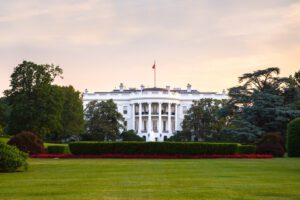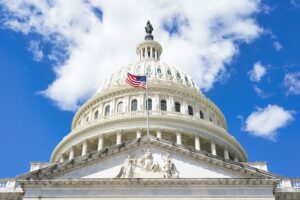Finding a Way Forward on Trade: Pragmatism in the Face of Challenges
A rising tide of antitrade sentiment has dominated trade policy since the turn of the century. Long- standing trade principles such as national treatment and most- favored-nation status (MFN) are becoming secondary to national security and values-based policies related to climate and labor priorities. No longer is it considered a given that domestic policy goals should be implemented in the ways least restrictive to trade.
These policy shifts occur amid parallel and intensifying pressure points in the global trading system. Meanwhile, the unanimous consent required by the World Trade Organization (WTO) for all major decisions has left the organization paralyzed. Geopolitical tensions continue to rise as does discontent with China’s participation in the WTO, with downstream impacts on supply chains. The global pandemic and the transition away from carbon- based energy additionally challenge the global trade framework in different ways.
The question now is whether the WTO system and its members can create a pragmatic framework for cross-border economic cooperation—one in which countries can work toward domestic policy goals in the way least restrictive to trade. We believe the near-term answer involves a recommitment to core principles and the pursuit of plurilateral agreements. Plurilateral agreements involve side agreements among a subset of WTO members. They operate in parallel with the multilateral trade infrastructure. When designed properly, they can complement and expand growth-enhancing cross-border trade.
The two main core principles are (a) national treatment, which means countries treat imported goods no better and no worse than domestically produced goods, and (b) most favored nation or MFN, which means each country grants the same trade advantages to one nation as it does to all other nations. The goal should be to choose the least-trade-restrictive mechanisms to achieve domestic policy priorities.
Read the Full Research Summary Here
08/07/2024 | Christine McDaniel & Barbara Matthews | Mercatus Center
How ‘Economic Security’ is Re-shaping Presidential Power

The Biden administration’s recent decision to raise tariffs on Chinese goods ranging from electric vehicles and advanced batteries to medical equipment came as little surprise in an election year. The White House described the move as one that would create “good jobs in key sectors that are vital for America’s economic future and national security.” This latest development followed the Trump administration’s original imposition of tariffs on other products from China in an effort to stop Beijing’s theft of sensitive technologies and intellectual property. Now, several years on, it is clear that imposing tariffs was only one exercise of the executive branch’s foreign commercial power – and one of an increasing number of tools that the executive branch justifies by linking foreign commerce issues to U.S. security.
Indeed, officials from both the Trump and Biden administrations have invoked economic security as a reason for action across a wide range of policy issues. In addition to tariffs on goods from China and on steel and aluminum, take the proposed outbound investment screening mechanism, the Trump administration’s efforts to force a sale of TikTok, or the extensive new export controls, as obvious examples. The justifications reflect a broader conversation on security that is now pervasive in trade policy circles. Compare the U.S. Trade Representative’s Annual Report published in 2016 to the version published this March. The 2016 report mentioned security 25 times, frequently in the context of food security. The 2024 report mentioned security 129 times. And the 2024 Report added a section on “enhancing economic security,” just one example of the securitization of U.S. foreign affairs, especially in Washington’s relationship with Beijing.
In a forthcoming article, we argue that this linking of “foreign commerce” to “economic security” in U.S. policymaking has had the effect of dangerously, and often erroneously, intermingling authority that Congress has delegated to the executive branch with the president’s constitutional powers to oversee foreign affairs. The Constitution assigns plenary authority over taxes, tariffs, and commerce – including, explicitly, foreign commerce – to Congress. The Constitution assigns other kinds of foreign affairs powers, such as the role of commander-in-chief of the armed forces or the power to negotiate treaties, to the president. The executive branch’s authority over foreign commerce began as a statutory authority, but over time the executive, with some backing from the courts, has increasingly claimed that such authority has constitutional dimensions. Constitutional claims over the president’s non-commercial foreign affairs authority have begun to engulf understandings of Congress’s plenary authority over the regulation of commerce with foreign nations – from the perspective of both the executive branch as well as the courts.
Assertions of Executive Branch Power in Foreign Commerce
Officials from both the Biden and Trump administrations have advanced novel arguments before the courts asserting this point: foreign commerce is part of security, and therefore the president has his own constitutional foundations for action in the domain of commerce. In a case concerning the Trump administration’s tariffs on steel and aluminum, the government argued that “[t]he President’s coexistent constitutional foreign affairs and national security responsibilities compel the conclusion that Congress did not enact an unconstitutional statute.” In the context of a case about tariffs, this claim is extraordinary. The text of the Constitution expressly allocates the power to tax, as well as the power to regulate foreign commerce, to Congress exclusively. It makes no difference that the statute in question – Section 232 of the Trade Expansion Act of 1962 – invites the president to evaluate a threat to national security as a predicate to exercising purely delegated power to impose taxes. Such an exercise of delegated power does not open the door to his constitutional authority; rather, it draws on his expertise.
07/16/2024 | Kathleen Claussen & Timothy Meyer | Just Security
The IRA Two Years On: A Signpost of the New Economic Policy Consensus
Signed into law on August 16, 2022, the Inflation Reduction Act was a legislative Rorschach test: It looked like different things to different people. To some, it was a climate bill. To others, it was a health care bill. And to others still—in fact, to the member of Congress who was perhaps most instrumental in achieving its passage, Senator Joe Manchin of West Virginia—it was an energy and national security bill. The legacy of the IRA will surely be closely tied to these annotations, and indeed, its contribution to achieving domestic and global net-zero greenhouse gas emissions targets is monumental.
However, two years on it is becoming increasingly clear that the legacy of the IRA is tethered to a renewed pact between government and the US economy, with key implications for trade, technological competition with China, and foreign policy writ large.
Since the early 1980s, the prevailing dogma on both sides of the aisle regarding US economic policy has largely been one of skepticism about direct government intervention in the economy. Trade and domestic market liberalization have been features of Republican and Democratic rhetoric since at least the Reagan administration. Of course, US government spending did increase over this period, and Washington did often step in with, for example, countercyclical spending during economic downturns. Nonetheless, most US politicians took as axiomatic that the government should not be “picking winners and losers” in the economy. The IRA has ushered in a new era in which this reflexive aversion to economic intervention may be vanishing.
Industrial policy has risen from the gutter
The IRA’s subsidies and grants for low-carbon electricity generation and technology manufacturing, along with its capitalization of the US Department of Energy’s Loan Programs Office, represent a divergence from the once-dominant economic policy consensus. The IRA is among the most significant government investments in the US economy since President Franklin D. Roosevelt’s New Deal. In fact, it is rivaled only by primarily demand-side stimulus packages, such as the American Recovery and Reinvestment Act (ARRA) of 2009 and the CARES Act of 2020.
08/15/2024 | William Tobin | Atlantic Council
Does EU’s Tariff Regime On Chinese Electric Vehicles Reflect Paradoxes In Its Environmental Sustainability Goals?
Following are excerpts from a report published by Eurasia Review:
The European Union has been established itself as an international leader in the field of environmental sustainability, showcasing a steadfast dedication to tackle the environmental protection climate change through a range of ambitious policies and programmes. The organization is dedicated to promoting electric vehicles (EVs) as a crucial solution in combating carbon emissions and the development of a greener future. However, the European Union’s tariff regime on electric vehicles from China has sparked a significant narratives and debates…
Paradoxes of EU’s Environmental Policy
The EU’s tariff regime on Chinese EVs brings attention to certain contradictions within its environmental protection policies. Although the tariffs have been implemented to protect European manufacturers from unfair competition resulting from Chinese subsidies, there is a potential conflict with the EU’s environmental protection goals. The imposition of tariffs on electric vehicles could potentially impede their widespread adoption and hinder the overall progress in reducing emissions.
This short-term protection of domestic industries could potentially hinder the long-term shift towards cleaner technologies. In addition, it is important to consider the broader impacts of making EVs more affordable, as this can greatly contribute to global climate efforts. The tariffs fail to adequately acknowledge the environmental consequences of EV production materials or take into account the wider advantages of higher EV adoption, which could undermine the EU’s overarching environmental sustainability goals.
08/20/2024 | Dr. Bawa Singh | Eurasia Review
WITA – We put the community in trade community.
Information about upcoming WITA and trade community events





